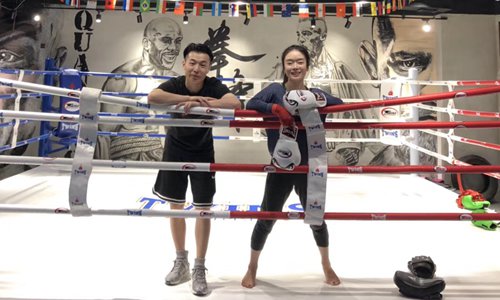
A woman poses for a photo with her trainer during a fighting class. (Photo: Courtesy of Quanfeng Fighting Club)
Cui He, a 26-year-old white-collar worker based in Shanghai, has been curbing her desire for new clothes and bags to save money for twice-weekly fighting classes instead.
"I have been spending around 3,000 yuan ($436.12) a month on the fighting club since I started training a year ago, accounting for about 30 percent of my total salary," Cui said, adding that the membership fee is almost the same as her monthly rent.
Several female fighters the Global Times interviewed on Tuesday said that the sport burns fat in a much faster way than regular gym exercises and that it's quite pressure-relieving, especially after an exhausting day at work.
"The calmness and orderly manner developed during the training will also reflect in your daily life," Cui noted.
She said that having fighting skills is also a powerful self-defense tool. Thus, despite the hobby seeming to be a bit expensive, the enthusiasm for the sport from women like Cui has been growing.
According to data provided by the Shanghai-based PlanBee Combat Training Club, women account for 60 percent of its total members, more than its male customers.
The club has a total of 300 members so far and the figure is expected to quickly increase in the future.
Beijing-based Quanfeng Fighting Club also said that members who take fighting classes - a traditionally male-dominated sports activity - are now an even mix of men and women, with more clubs eyeing the potential market for female fighting lovers.
Currently, there are more than 200 fighting clubs in Beijing, after the exercise came into the spotlight in 2016, making the industry quite competitive, Ma Yunpeng, founder of Quanfeng Fighting Club, told the Global Times on Monday.
Future plans
However, the hype brought about by this increasing popularity did not last long.
Some of these newly established fighting clubs do not have qualified coaches and standard teaching agendas, causing some disorder and possibly hindering the industry from expanding in the future.
"A systematic training system and qualified coaches are necessary for further the promotion of the exercise, especially at such an early stage, when the fan base is still limited and not solid," Ma noted.
In fact, the number of fans lags behind the expansion rate of fighting clubs, Ma said.
Zhang Hudong, an independent sports analyst, cautioned that high costs and thus high membership fees will also hamper the industry from developing into a cultural phenomenon, since it might be seen as too prestigious to develop into an everyday hobby for the general public.
"And most people still hold the typical impression that the exercise is male-dominated and can cause you to easily get hurt. Some may even consider it as a dangerous activity, making it hard to become a phenomenon like the gym or yoga," Zhang said.
A private fighting class could cost as much as 700 yuan per person in Beijing, and for an annual membership, the price could be around 10,000 yuan per person.
"I won't give up this hobby for now, but if something happens, for example, I buy a house, maybe I would turn to much more affordable classes, though I don't want to," Cui said.
Gao Lijun, founder and CEO of PlanBee and a women's 57-kilogram champion of the World Boxing Association, told the Global Times on Wednesday that her company is now focusing on tailoring teaching plans to target different groups, such as women, men and children, but will not expand and open branches in a rush.
"It could take some time for the public, as well as those potential investors, to find the charm in fighting. Before that, I will try to build the brand," Gao said.
"The government's promotion of nationwide fitness programs also provides us with a preferential environment for developing those once rarely known sports activities such as fighting," Ma said, adding that sustaining the existing membership is the priority for his club at the moment.


